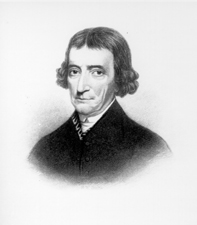John Chandler
| John Chandler | |
|---|---|
 |
|
|
United States Senator from Maine |
|
|
In office June 14, 1820 – March 3, 1829 |
|
| Preceded by | inaugural holder |
| Succeeded by | Peleg Sprague |
| 1st President of the Maine Senate | |
|
In office March 15, 1820 – June 19, 1820 |
|
| Preceded by | inaugural holder |
| Succeeded by | William Moody |
| Member of the U.S. House of Representatives from Massachusetts's 17th district |
|
|
In office March 4, 1805 – March 3, 1809 |
|
| Preceded by | Phineas Bruce |
| Succeeded by | Barzillai Gannett |
| Member of the Massachusetts Senate | |
|
In office 1803-1805 |
|
| Personal details | |
| Born | February 1, 1762 Epping, New Hampshire |
| Died | September 25, 1841 (aged 79) Augusta, Maine |
| Resting place | Mount Pleasant Cemetery |
| Political party |
Democratic-Republican Democratic |
John Chandler (February 1, 1762 – September 25, 1841) was an American politician and soldier of Maine. The political career of Chandler, a Democratic-Republican, was interspersed with his involvement in the state militia during both the American Revolutionary War and the War of 1812.
Chandler was born in Epping, New Hampshire. He was one of 10 children and the third-oldest son of Joseph Chandler (1725-1776) and his wife Lydia (née Eastman; 1726-1820). His father Joseph was a blacksmith. He fought in the French and Indian War and was a captain in the Revolutionary War. He has fallen in 1776 in Mount Independence.
Chandler was self-educated and enlisted in the Continental Army at age 15. In the same year he was captured by the British, but he escaped soon. In May 1779 he was captured again. In September, he was able to escape and made his way back to Epping. Immediately he reenlisted in the Continental Army. During the war he had become the protégé of General Henry Dearborn, (1751-1829), a future fifth U.S. Secretary of War (1801-1809), who was also an important commander of the Northeast sector at Fort Detroit, in the Old Northwest Territory, but a terrible failure during the War of 1812.
On August 27, 1783, Chandler married Mary Whittier, with which he had seven children (three sons and four daughters).
After the end of the war, Chandler was both illiterate and without money. However, he borrowed money from Dearborn and bought a farm near Monmouth, Maine in Kennebec County, then a part of Massachusetts. He settled there with his family in 1784. A local schoolmaster gave him all the support he needed to catch up on his schooling quickly. He worked hard as a blacksmith, prospered over the years and became a respected member of the community.
...
Wikipedia
